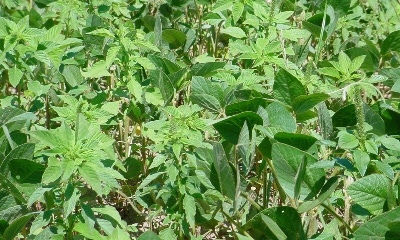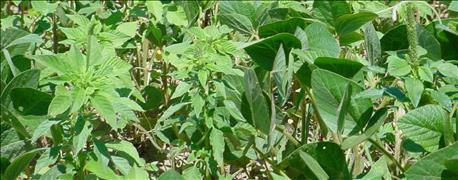
Palmer amaranth is still sitting at the top spot as the "weed to watch," according to University of Missouri weed scientist Kevin Bradley.
In a recent MU Integrated Pest Management Newsletter, Bradley explained that while waterhemp (Amaranthus rudis) is still the most common and troublesome weed in corn and soybean production throughout most of Missouri, Palmer amaranth (Amaranthus palmeri) is the most troublesome weed in the state.
Palmer has been in the state for nearly 12 years, but became a major weed threat when it became resistant to glyphosate herbicide. It is much more aggressive and competitive pigweed than waterhemp.

KEEP CONTROL: Palmer amaranth is a weed that can impact soybean yields. It is one that farmers need to watch out for this season. Develop a control strategy early.
Soybean growers in particular face a challenge from the weed, which brings multiple threats.
For starters, each weed produces about 300,000 seeds. Worse, the herbicide resistance is transmitted by pollen. And seed can be transported in used equipment; in feed, seed, or hay coming out of the southern U.S.; and University of Missouri research has shown waterfowl can also transport Palmer amaranth seed.
What to look for
Unlike most weeds, male and female Palmer amaranth plants-often called Palmer pigweed by farmers--are separate. Pollen must travel through the air to fertilize the flowers that produce the seeds. A characteristic of the pigweeds is the tall flower stalks with hundreds of florets.
Palmer germinates from early spring until late in the growing season. It just doesn't stop reproducing, Bradley says. That allows it to outlast the longest-lasting residual herbicides.
The plant grows fast, up to 2.5 inches a day. And it grows tall, taking over a soybean field by shading out the crop.
Only 2.5 plants per foot of row can hide a growing soybean crop. One of the primary ways to differentiate Palmer amaranth from waterhemp is by the presence of the leaf petioles, which according to Bradley, are usually as long as or longer than the leaf blades themselves. Palmer amaranth leaves are also more diamond-shaped in outline, and often have a poinsettia-like leaf arrangement when viewed from above
Constant control
Palmer amaranth is a complex weed. Control requires constant intensive management.
As with most weeds, but especially Palmer pigweed, the days of "one spray one day and done" are long gone.
Palmer resists glyphosate and four other herbicide modes of action. In Missouri, Palmer is resistant only to glyphosate.
In spite of resistance, producers can control the pest. But it takes lots of work.
Check with your agronomist and develop an action plan early this year. Make sure it includes proper seed selection, along with a pre and post emergence herbicide program.
About the Author(s)
You May Also Like






